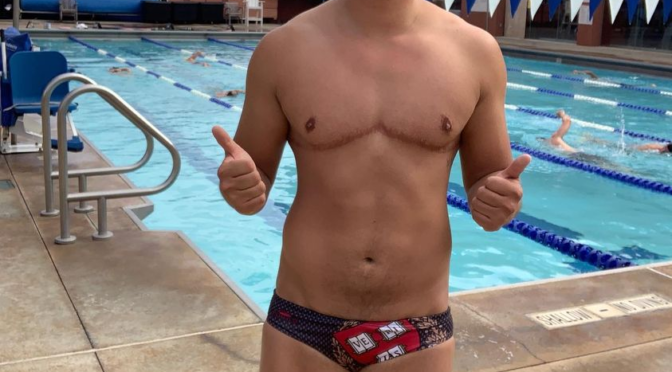“The belief that trans people are any less of who we are because our bodies do not fit society’s binary is toxic, harmful, and remnants of a very false dichotomy. So to all the other trans people who feel like their bodies are also critiqued or called not man or woman enough. You are you regardless. Your body is yours. If someone else makes you feel small or lesser by attempting to belittle you, that is on them. Not you. Your body is valid. Your gender is also valid. Even if society does not validate it. I see you.”
Schuyler Bailar
Manta rays are incredible animals. They are beautiful and amazing to watch as they glide through the ocean waters with speed and grace. Having the largest brain to body mass ratio of all fish, they are extremely intelligent. The world is more beautiful because of their presence, but due to their relatively small population, they are a vulnerable species. Like the manta ray, Schuyler Bailar is a gifted swimmer and extremely intelligent. It is fitting that he chose the name Pink Manta Ray for his website and social media accounts since the only known pink manta ray was first seen in 2015, the same year the Washington Post wrote about him as one of the best moments of the trans community that year.
Bailar began swimming when he was just one year old and has been involved in the sport ever since. He earned honors and set records when he competed for the Langley Wild Things, Sea Devil Swimming, Georgetown Day School, and Harvard University. Although the list of his accomplishments in swimming are impressive, perhaps his greatest contribution to the sport is his work to make the sport more inclusive. He is the the first openly transgender collegiate swimmer in U.S. history, and the first NCAA transgender man to compete as a man in any sport.
Life has not just been awards and honors for Bailar, it has also included a lot of challenges and turmoil. As a child Bailar always wanted to be a boy. He once said, “I wanted to be more of a boy than the next boy.” When he started high school he wanted to feel like he fit in somewhere so he made a conscious decision to start conforming and living as a girl. “I wanted validation from other people. I wanted to feel like I fit in somehow, to feel like I was somewhat normal on some level.” While others did compliment him, it didn’t give him the validation he was seeking. Then in his junior year of high school he knew he needed help. He started therapy and entered a clinic for eating disorders. It was there that he was first able to openly discuss his gender identity. He was able to come to terms with his gender identity when he attended workshops at the YES! Institute. He began transitioning in the fall of 2014 and had a double mastectomy in 2015. He documented his progress on social media in an effort to help others.
One of his concerns in transitioning was what that would do to his swimming career. He had been recruited and competed for the Harvard women’s swim team but thanks to understanding coaches, after transitioning he was moved to the men’s swim team. He was nervous about how the other guys on the swim team would treat him. He was pleasantly surprised to find his teammates were very supportive. “They just treat me like a regular guy,” he said. “They’re great people.”
Bailar continues to be involved in the sport of swimming and is featured in the USA Swimming cultural inclusion guide for both Asian American and LGBTQ athletes. He was featured on the CBS Sunday Morning Show and singled out as a spokesperson for the Trans community. He continues to be a strong advocate for trans athletes and works tirelessly to fight for their rights.
